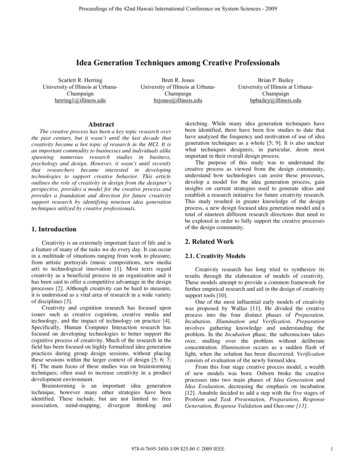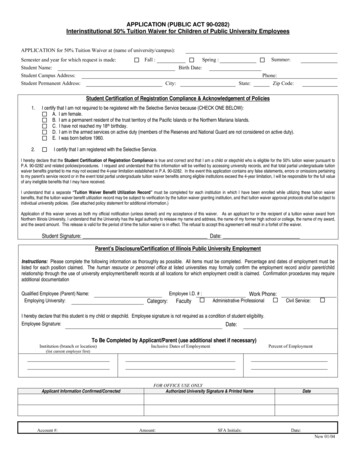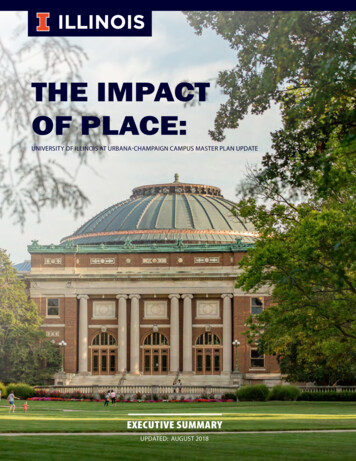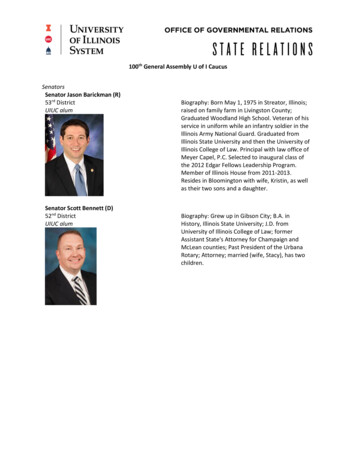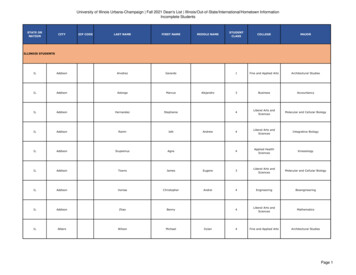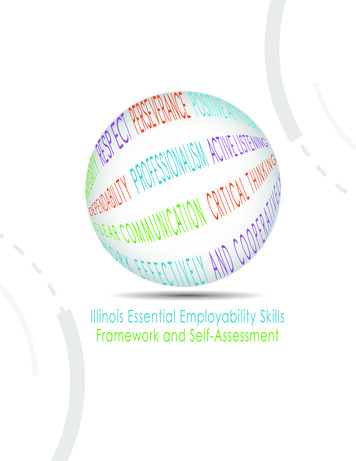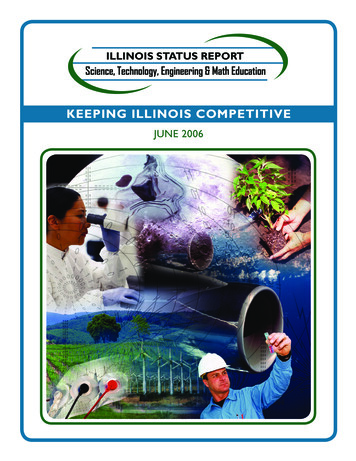
Transcription
UNIVERSITY OF ILLINOIS AT URBANA-CHAMPAIGNSTATE UNIVERSITIES CIVIL SERVICE SYSTEM COMPLIANCE AUDITUniversity of Illinois at Urbana-ChampaignFinal Audit ReportTable of ContentsIntroduction . 1Executive Summary . 4Material Findings, Recommendations, Institutional Corrective Action Plans and AdditionalAuditor Comments . 5AppendicesAppendix A: Exemption Authorization Applied to Positions That Match Civil Service ClassSpecificationsAppendix B: Exemption Authorization Applied to ‘Academic Hourly’ Positions That MatchCivil Service Class Specifications
UNIVERSITY OF ILLINOIS AT URBANA-CHAMPAIGNSTATE UNIVERSITIES CIVIL SERVICE SYSTEM COMPLIANCE AUDITUniversity of Illinois at Urbana-ChampaignFinal Audit ReportIntroductionPURPOSEThe State Universities Civil Service System was created as a separate entity of the State ofIllinois and is under the control of the University Civil Service Merit Board as set forth in Section36b(3) of the State Universities Civil Service Act (Act) (110 ILCS 70/36b(3)). The purpose of theState Universities Civil Service System is to establish a sound program of personneladministration for its constituent employers (110 ILCS 70/36b(2)). To achieve this purpose, theMerit Board has been given a broad range of statutory powers and duties, which include thepower to make rules to carry out the purpose of the State Universities Civil Service System andto appoint an Executive Director to administer the Act (110 ILCS 70/36d(11) and (12)).As part of its statutory power, the Merit Board has promulgated rules that delegate to theExecutive Director the authority and responsibility for conducting “ongoing audit programs ofall Civil Service operations at all places of employment for the purpose of assuring compliancewith the [Act (110 ILCS 70/36b et seq.)] and [Part 250 of the Illinois Administrative Code (Code)(80 Ill. Adm. Code 250)] and for improving the programs of personnel administration of itsconstituent employers” (80 Ill. Adm. Code §250.140(c)).This report communicates the final outcome of a comprehensive human resource operationalaudit, which included an on-site evaluation that was conducted June 17-21, 2013 and June 2428, 2013. On December 11, 2013, an informational meeting regarding the initial Draft AuditReport was held at the System Office with Dr. Robert Easter, President; Mr. Walter Knorr, VicePresident and Chief Financial Officer; and Ms. Maureen Parks, Designated EmployerRepresentative (DER). A formal exit conference was conducted on March 18, 2014, whichprovided an opportunity for the Employer to discuss both the Material and Non-Materialfindings contained in the initial Draft Audit Report. On March 28, 2014, the Employersubmitted additional information regarding the Draft Audit Report findings and as a result, aRevised Draft Audit Report was submitted April 23, 2014. Upon completion of the exitconference, Revised Draft Audit Report, and submission of the Institutional Corrective ActionPlan, a Final Audit Report (Material Findings only) is sent to the Employer, and a SupplementalReport (Non-Material Findings) is sent to the campus/agency Human Resource Office forinternal use.OVERVIEWThe following Human Resource activities were reviewed and utilized in identifying the Material(Final Audit Report) and Non-Material Findings (Supplemental Report): 1
UNIVERSITY OF ILLINOIS AT URBANA-CHAMPAIGNSTATE UNIVERSITIES CIVIL SERVICE SYSTEM COMPLIANCE AUDIT Assignment of Positions to ClassesThe Auditor completes a review of selected job descriptions for timely updates, properadministration, and correct assignment of position classifications. Additional deskaudits of selected positions are conducted onsite for appropriateness of positionclassifications. There is also an evaluation of the Employer’s position audit process andcorresponding determinations. Compensation ProgramsThe Auditor completes an analysis of the Employer’s use of pay rates and pay ranges, asapproved by the Merit Board. An overall evaluation is then conducted of the Employer’scompensation program and initiatives to meet requirements of pay equity within theEmployer’s market area. Examination ProgramThe Auditor conducts a review of pre-employment testing operations. This includes testadministration, admission procedures of applicants to examinations, license andcertification verifications, scheduling, security, and register management. Administration of Employment and Separation ProceduresThe Auditor reviews the Employer’s business processes and procedures related to theemployment cycle, including pre-employment activities, probationary and statusemployment, and employment separation programs. There is also an assessment of theEmployer’s utilization and monitoring of non-status appointments. Administration and Employment Protocols of Positions Exempt from Civil ServiceGuidelinesThe Auditor completes a review of the employment protocols and assignedresponsibilities for Principal Administrative Appointments. This review is conducted toassure compliance with recognized exemption authorization procedures.TheEmployer’s exemption forms and related position descriptions are reviewed andselected incumbent interviews are conducted for validation of approved exemptions.The audit process also includes a review of the Employer’s administrative proceduresrelated to these appointments and their approved exemption status. General Review of the Employer’s Human Resource ProgramThe Auditor completes a general review of the Employer’s human resource programswith respect to effectiveness, efficiency and levels of communication to constituencies.There is also an assessment of the recognition and interaction of human resourceprograms within the Employer’s faculty, administrative and support staff employeegroups. The impact of new technology on the recordkeeping and processing ofinformation is also an element for review. 2
UNIVERSITY OF ILLINOIS AT URBANA-CHAMPAIGNSTATE UNIVERSITIES CIVIL SERVICE SYSTEM COMPLIANCE AUDIT Other Follow-up Items from Previous AuditOther follow-up items from previous audits, as well as other matters deemed necessaryand appropriate, may have been reviewed and submitted as additional audit topics.The following staff members from the System Office in the Operations and Audit Division weredirectly responsible for conducting various aspects of the audit:Lucinda Neitzel, Assistant DirectorDanielle Routh, Program CoordinatorJeff Brownfield, Coordinator, Special AssignmentsPaula Mitchell, Human Resource Assistant 3
UNIVERSITY OF ILLINOIS AT URBANA-CHAMPAIGNSTATE UNIVERSITIES CIVIL SERVICE SYSTEM COMPLIANCE AUDITUniversity of Illinois at Urbana-ChampaignFinal Audit ReportExecutive SummaryYEAR ENDED – FY2013The compliance testing performed during this examination was conducted in accordance withState Universities Civil Service Act (110 ILCS 70/36b et seq.), Part 250 of the IllinoisAdministrative Code (Code) (80 Ill. Adm. Code 250), State Universities Civil Service ProceduresManuals, applicable University/agency policies/procedures, and auditing standards.SUMMARY OF MATERIAL FINDINGSNumber ofThis ReportFindingsRepeated findings from previous audit 2 2 SCHEDULE OF MATERIAL FINDINGSItemNumberUIUC FY13-01UIUC FY13-02PageDescription5FINDINGS (STATE UNIVERSITIES CIVIL SERVICE ACT)Exemption Authorization Applied to Positions That Match CivilService Classification Specifications 13FINDINGS (ILLINOIS ADMINISTRATIVE CODE)Exemption Authorization Applied to ‘Academic Hourly’ PositionsThat Match Civil Service Classification Specifications 4
UNIVERSITY OF ILLINOIS AT URBANA-CHAMPAIGNSTATE UNIVERSITIES CIVIL SERVICE SYSTEM COMPLIANCE AUDITUniversity of Illinois at Urbana-ChampaignFinal Audit ReportMaterial Findings, Recommendations, Institutional Corrective Action Plan andAdditional Auditor CommentsUIUC FY13-01Exemption Authorization Applied to Positions That Match Civil ServiceClassification SpecificationsCriteria/Standards (i.e., what should exist):1) State Universities Civil Service Act (Act), Section 70/36e Coverage2) Illinois Administrative Code (Code), Section 250.30(a) Coverage3) Exemption Procedures Manual, Section 1.1 Overview4) Exemption Procedures Manual, Section 3.1 Principal Administrative Appointments5) Exemption Procedures Manual, Section 6.3 System Office Review6) Exemption Procedures Manual, Section 8.2 Changing an Exempt Position to a CivilService PositionThese guidelines provide that all positions are Civil Service, except as categorically outlined.Exemptions are allowed in accordance with procedures, requiring either documentedexemption approval from the System Office or verification of exemption authorization throughthe position descriptions when general titles are used. Accordingly, a periodic review andupdate of position descriptions are required to confirm that these exemption authorizationsremain valid.Periodic job description reviews, updated procedures, and ongoing classification plan changesmay indicate that a position originally identified as a Principal Administrative Appointment(PAA) may have been incorrectly exempted, may have been changed, or may now fall withincivil service classification plan parameters, requiring a department to convert this position, andany employee currently occupying these positions, to an identified and appropriate Civil Serviceclassification.In this respect, biennial compliance audits of University System employers will include, but notbe limited to: Comprehensive review of position descriptions and position analysisCompliance with statutory and procedural criteria for exemptionsAdequacy and thoroughness of related employment proceduresAdequacy of internal review and exemption approval processesThoroughness and accuracy of quarterly reporting requirementsAny other associated special interest items 5
UNIVERSITY OF ILLINOIS AT URBANA-CHAMPAIGNSTATE UNIVERSITIES CIVIL SERVICE SYSTEM COMPLIANCE AUDITWhen it has been determined and established that the job responsibilities and duties of aposition do not meet the criteria for a PAA exemption under Section 36e(3) of the Act, theEmployer may be required to change the position from an exempt appointment to anappropriate Civil Service appointment in a recognized classification.Conditions/Facts (i.e., what actually exists):The FY2013 Biennial Compliance Audit time frame for the University of Illinois at UrbanaChampaign was February 1, 2011 through January 31, 2013. Based on a payroll snapshot takenon April 8, 2013, the Employer reported two thousand seven-hundred eighty-seven (2,787)Principal Administrative Appointments, 36e(3) exempt, actively employed at that time. TheAuditor selected a large and targeted position description sample to determine compliancewith respect to the overall utilization, management, and designation of positions exemptedfrom Civil Service statutory regulations.Through a review of approximately three-hundred twenty (320) position descriptions, includingon-site interviews with various exempted employees, it was determined that two hundredeighty-nine (289) exempted positions listed in Appendix A were performing duties matchingthe specifications for various Civil Service classifications. Overall, the positions cited in thisfinding do not appear to contain the scope, duties, or level of authority and responsibility thatwould typically fall outside the specifications of standard professional or technical Civil Serviceclassifications.The Auditor completed a departmental review with respect to the two hundred eighty-nine(289) positions cited in Appendix A. The departments that account for many of the exemptedpositions cited are listed below with the number of positions cited therein:College of Engineering:Campus Information Technology and Educational Services:University Administration:Undergraduate Admissions and Financial Aid:College of Agriculture, Consumer, and Environmental Sciences:Department of Intercollegiate Athletics:Illini UnionTotal:31292521161313148 positions citedCause (i.e., why deficient condition occurred):It appears that the Employer does not have adequate business processes in place to properlyanalyze positions, manage employment protocols, or designate exemption status in accordancewith standardized protocols. In reviewing the position description documents submitted to theAuditor, it appears that, in many instances, positions are exempted through a simple requisitionfrom the department with an electronic approval protocol through both Academic HumanResources and Staff Human Resources. The Auditor did not observe or obtain documentation 6
UNIVERSITY OF ILLINOIS AT URBANA-CHAMPAIGNSTATE UNIVERSITIES CIVIL SERVICE SYSTEM COMPLIANCE AUDITto verify the utilization of any sort of comprehensive position analysis process, or tool, inestablishing and validating the exemption status of these positions.Effect (i.e., impact of the problem):Of the exempted positions cited in Appendix A, it should be noted that the Date ofAppointment for two-hundred twenty-five (225) of these positions was within the audit timeframe, with one-hundred and ten (110) of these positions/incumbents also being newlyemployed. The total number of new appointments account for 70% of the positions cited inthis finding. Appropriate classification plan management protocols that properly analyze andevaluate position descriptions are essential in validating exemption authorizations compliancewith the Act, Code and Procedures in this respect.Finding from Previous Audits:During the FY2011 Biennial Compliance Audit, the Auditor reviewed approximately twohundred (200) exempt position descriptions, including on-site interviews with variousexempted employees, and identified one-hundred twenty-two (122) positions that appeared tobe performing duties and responsibilities comparable to those found in Civil Serviceclassifications. [Finding Code UIUC FY11-01, pages 5-10].During the FY2009 Biennial Compliance Audit, the Auditor reviewed approximately onehundred fifty (150) exempted position descriptions, including on-site interviews with variousexempted employees, and identified thirty (30) positions that appeared to be performing dutiescomparable to those found in Civil Service classifications. [Finding Code UIUC FY09-01, pages 46].Recommendation:As a result of the FY2011 Biennial Compliance Audit regarding this topic, the Employer indicatedin their Institutional Corrective Action Plan (ICAP) that the campus consistently utilizes theguidelines provided by the Merit Board through the Exemption Procedures Manual. TheEmployer provided assurances that through their review of these positions, that an increasedlevel of scrutiny has been applied to assure compliance in this respect. Based on the outcomesfor the current FY2013 Biennial Compliance Audit, business processes and accountabilitystandards consistent with statutory and procedure references on this topic need to be furtherevaluated. A more comprehensive job analysis process is recommended.The Employer is reminded that exemption authorization is a direct statutory responsibilitydelegated to the Merit Board, who has specifically empowered Employers through variousprocedures to make these exemption determinations.The Designated EmployerRepresentative (DER) of each university and affiliated agency has the responsibility to developand maintain protocols consistent with the statutory and procedural guidelines related to thisimportant delegated authority. Additionally, the Illinois Administrative Code, Section 250.30(a)specifically provides that the Merit Board has the authority to determine PrincipalAdministrative Appointments (PAA) at each institution or agency. Specifically, it states that 7
UNIVERSITY OF ILLINOIS AT URBANA-CHAMPAIGNSTATE UNIVERSITIES CIVIL SERVICE SYSTEM COMPLIANCE AUDIT“The Director shall publish guidelines for such exemptions, as approved by the Merit Board.”We refer the Employer to these guidelines located in the Exemption Procedures Manual,Section 3.1, Principal Administrative Appointments and Section 4.1, Teaching, Research, andExtension Faculty Appointments, approved by the Merit Board in June 2009.In accordance with the statutory intent and basic premise contained in these standards, theassignment of positions to Civil Service classifications when the position description matchesappropriate classification specifications must take precedence over the use of exemptionsthrough utilizing standard titles. It should be noted that more than half of the positions cited inthis finding can be easily utilized within very flexible position classification structures containedin professional, semi-professional, technical, and managerial occupations within the currentCivil Service classification plan. The flexibilities provided within the Custom Classificationstructures include broad banding scoring variables and credentials assessment (resume review)examination components. Specialized Position Certifications (Specialty Factors) are authorizedand approved at the campus Human Resources level, which when defined appropriately for theposition to be utilized can actually minimize the time frame for recruitment, selection andemployment of the most qualified candidate to assume the duties and responsibilities of thatposition. These classifications include Accounting Associate, Human Resource Associate,Business/Administrative Associate, Information Technology Support Associate, InformationTechnology Technical Associate, Information Technology Manager/Administrative Coordinator,and Program/Student Advisor.In order to properly regulate and manage these appointments, we request that the HumanResource Office immediately evaluate/assess current protocols and establish, if needed,additional accountability standards to routinely review and maintain all exempt positiondescriptions in accordance with the Exemption Procedures Manual. Additionally, werecommend that the Employer complete an in-depth review of the position descriptions forthose positions listed in Appendix A to further determine if they meet the specifications of therecommended Civil Service classifications.Specifically, positions determined to beinappropriately exempted and flagged through the compliance audit process must be reviewedas a matter of standard protocol at the next contract renewal date. If it is determined thatthese positions match the specifications of the recommended Civil Service classifications, theyshould be transitioned to a Civil Service appointment as soon as possible. We refer theEmployer to the Exemption Procedures Manual, Section 8.2, Changing an Exempt Position to aCivil Service Position for guidance in transitioning these positions to appropriate Civil ServiceAppointments. Again, please note that positions designated for transition through the auditprocess will be reviewed in the next biennial audit process and must be monitored by theEmployer periodically.Due to the level of non-compliance related to this topic, the System Auditor will be scheduling afollow-up Supplemental Audit solely with respect to this topic within the next twelve months.This Supplemental Audit will include only a review of all exempt positions authorized and filled(employed) within a six month time frame after the release date of the final audit report, to 8
UNIVERSITY OF ILLINOIS AT URBANA-CHAMPAIGNSTATE UNIVERSITIES CIVIL SERVICE SYSTEM COMPLIANCE AUDITinclude most specifically a review of the position description for every exempt positionemployed during this time frame and the protocol utilized in reaching the exemptiondetermination. This Supplemental Audit Process should serve to verify that proper businessprocesses and accountability standards, consistent with statutory and procedural guidelines,have been reinforced and followed in this respect. The Employer is reminded that uponnotification of these significant non-compliance issues, the Merit Board may take any action asdeemed necessary to further evaluate and reconcile this issue.Institutional Corrective Action Plan—provided by Elyne G. Cole, Associate Provost for HumanResourcesThe University of Illinois at Urbana-Champaign disagrees with the Auditor’s findings.Specifically, we disagree that the positions cited in Appendix A were inappropriately exempted.The University continues to use the guidelines developed and provided in the ExemptionProcedures Manual, which includes the criteria and standards developed in 1998 through acollaborative effort between the public universities and the State Universities Civil ServiceSystem. This process developed criteria to support the statutory exemptions and a series of‘standard titles’ with representative duties to be used by the campuses in exempting principaladministrative appointments.The University utilizes a holistic job analysis process that includes consideration of a number offactors. The factors considered in our job analysis are: an evaluation of whether the position meets any of the exemption criteria as defined inthe Exemption Procedures Manualan assessment of whether the duties fit within the description of typical duties for astandard title, all of which are contained in the Exemption Procedures Manuala review of the required qualifications as identified by the hiring unitconsultation with the hiring unit and an analysis of the operational needs and anyadditional clarification of the position’s level of scope, authority and responsibilityan analysis of comparable positions in order to maintain consistency in the classificationof the campus workforcea review of whether a civil service classification more appropriately fits the positionIt cannot be overstated that a primary reason for the delegation of the exemption authority tothe campuses was the acknowledgment that the campus HR staff inherently has a morecomplete understanding of campus needs and operations than an external auditor could gatherfrom a limited interview or paper review. The 289 cited positions were exempted using theholistic approach outlined above. 9
UNIVERSITY OF ILLINOIS AT URBANA-CHAMPAIGNSTATE UNIVERSITIES CIVIL SERVICE SYSTEM COMPLIANCE AUDITHowever, it is apparent that the approaches utilized by the University and the Auditor todetermine exemptions are in conflict. In this draft audit report, the Auditor states “it wasdetermined that two hundred-eighty nine (289) exempted positions listed in Appendix A wereperforming duties matching the specifications for various civil service classifications.” It seemsthe System Auditor uses a limited approach to the evaluation of exempted positions by limitingtheir assessment to a single criterion: whether the duties of the position match the duties of acivil service classification. Therefore, in doing so, the evaluation inappropriately denies use ofthe statutory exemptions, as well as denying the use of the exemption criteria and the standardtitle designation provisions contained in the Exemption Procedures Manual.We agree with the System Office that there will be occasions to have overlap in positionsspecifications within a complex classification structure. As noted in the Procedures Manual,Exemption Overview section:Within any complex classification plan, there are instances of overlap in positionspecifications, assigned duties, and responsibilities. However, there was never anyintent to permit or condone the conversion of traditional civil service positions toexempt status by virtue of the fact that the positions may appear to correspond to thegeneral definitions of positions contained in these exemption categories. If a positiondescription matches the specifications for any civil service classification, the positionmust be designated as civil service.We accept there was never any intent to permit or condone the conversion of traditional civilservice positions as noted above. However, we also believe there was never any intent to denythe use of the statutory exemptions from civil service as outlined in Sections 36e3 and 36e4 ofthe Civil Service Act. Nor was it ever intended to condone the conversion of traditionallyexempted positions to civil service positions by virtue of the fact that the exempted positionsmay appear to correspond to the general definitions of civil service classifications. Therefore, ifa traditionally exempted position fits the exemption criteria and fits within anapproved standard title definition, the position is appropriately exempted from civil service.The University of Illinois at Urbana-Champaign appropriately utilizes the PAA exemptionprocess and the use of standard titles. We will, however, review the positions listed inAppendix A.Additionally, the Auditor has indicated the System Office intends to conduct a SupplementalAudit of exempted positions within six months of the receipt of the Final Audit Report. Inlooking at the calendar, this supplemental audit would occur in early 2015, the same time thecampus HR office is obligated to begin the biennial audit process. We, therefore, request thatany follow-up or supplemental audit activities be undertaken as part of the FY 2015 biennialaudit process. 10
UNIVERSITY OF ILLINOIS AT URBANA-CHAMPAIGNSTATE UNIVERSITIES CIVIL SERVICE SYSTEM COMPLIANCE AUDITAdditional Auditor Comments:The Exemption Procedures Manual, as approved by the Merit Board in June 2009, establishesgeneral criteria to be used in determining and validating exemptions. The criteria set forth inthese procedures were carefully developed between the System Office and several employerand employee constituency groups, in order to best preserve the historical intentions of relatedstatutory provisions in the State Universities Civil Service Act (Act), Section 70/36e and theIllinois Administrative Code (Code), Section 250.30(a). As the Employer stated in theiradministrative response, according to these procedures, “if a position description matches thespecifications for any Civil Service classification, the position must be designated as CivilService”. Therefore, when Civil Service classifications are available, for any position within theUniversity System, it is first required to be inclusive within the Civil Service classification planand not an optional election for exemption through the use of standard titles. Only after aposition has been validated for exemption, should it then be categorically defined by generaltitle. Accordingly, there are several applicable Civil Service classifications which contain theduties and responsibilities directly associated with the positions outlined in this finding andlisted in Appendix A.The Employer indicates in their administrative response the use of a holistic job analysis processwhich considers a number of factors and has been applied to the exempted positions cited inAppendix A. While this may be the case, positions designated as exempt from Civil Serviceregulatory requirements must also be validated through the biennial audit process as directedin the Exemption Procedures Manual. The Employer is charged with developing and detailingspecific methods utilized in exempting positions, e.g., job analysis models, occupational surveyinstruments, other position analytics, etc. Offering a written explanation outlining a holistic jobanalysis process does not provide the level of process detail required to properly validate theexemption determinations. A much more detailed and defined job analysis process is indicatedhere.According to the Exemption Procedures Manual, by definition, a Principal AdministrativeAppointment (PAA) “is defined as an employee who is charged with high level administrativeresponsibilities, whose decisions are based on administrative policies and who exercisesdiscretion and independent judgment.” Additionally, these appointments “can be defined as anemployee who is in a position requiring knowledge of an advanced type in a field of science orlearning customarily acquired by a prolonged course of specialized intellectual instruction andstudy, which requires the consistent exercise of discretion and judgment.” In this respect, thepurpose and intent of applying these definitions are based on requirements in the Act andCode, to include the validation of exemptions through the biennial compliance audit process.As the System Office has continually emphasized, the cornerstone of proper position controlmanagement lies with the proper administration and maintenance of the position description.As a matter of information, the Auditor performs an analysis of the position descriptiondocument for each position sampled. The following basic standards are applied during thisanalysis process: 11
UNIVERSITY OF ILLINOIS AT URBANA-CHAMPAIGNSTATE UNIVERSITIES CIVIL SERVICE SYSTEM COMPLIANCE AUDIT The first component is the comparison between the position description documents andthe classification specifications outlined in the Civil Service class plan. This basicprinciple is most consistent with the Act and Code in this respect, and includes a reviewof the position’s scope and purpose, as well as an analysis of the duties andresponsibilities assigned for the work to be performed, in conjunction with those dutiescontained within the applicable Civil Service classification specifications. A secondary component is an evaluation and measurement of several abstract jobvariables associated with the exempted position, and referenced through the job dutiesand responsibilities contained in the position description, such as discretion, autonomy,independent judgment, complexity, etc. These measurements are used to furtherdetermine and validate the accuracy of the Employer’s initial asses
The State Universities Civil Service System was created as a separate entity of the State of Illinois and is under the control of the University Civil Service Merit Board as set forth in Section . The FY2013 Biennial Compliance Audit time frame for the University of Illinois at Urbana-Champaign was February 1, 2011 through January 31, 2013 .
